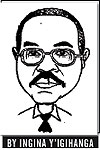You’d’ve thought I’d’ve learnt my lesson, but where! While still a refugee teaching in Kenya, one time I was travelling in a matatu (minibus commuter taxi known as twegerane here in Kigali) with a relative of mine. When time came for us to pay the taxi fare, I offered to pay for Franco, my relative, and myself. However, the conductor didn’t have the necessary change when I offered a twenty-shilling note. Since the journey was 3.50 Kshs a person, that meant 7 Kshs for both of us.


You’d’ve thought I’d’ve learnt my lesson, but where! While still a refugee teaching in Kenya, one time I was travelling in a matatu (minibus commuter taxi known as twegerane here in Kigali) with a relative of mine. When time came for us to pay the taxi fare, I offered to pay for Franco, my relative, and myself.
However, the conductor didn’t have the necessary change when I offered a twenty-shilling note. Since the journey was 3.50 Kshs a person, that meant 7 Kshs for both of us.
I also had a five-shilling note, but didn’t have the additional 2Kshs, so I asked Franco in Kinyarwanda: "Ufite amashilingi abiri?” (Do you have two shillings?)
Franco didn’t have the coins either, but a lady who sat next to me offered to pay the two shillings. Turning to thank her, I looked at her carefully to determine how she was able to understand my Kinyarwanda question. She was quite well endowed size-wise, with that deep, dark complexion typical of a Dholuo woman, so I expressed my gratitude in Kiswahili.
Franco remarked in Kinyarwanda: "Ikigore cyagukunze!” The remark wouldn’t have been so terrible if he’d said umugore, but Kinyarwanda language has a way of parking a lot of connotations in just the first letters of a word. So, while ‘umugore yagukunze’ means ‘the lady has fallen for you’, ‘ikigore’ changes it to ‘the fat, ugly woman has fallen for you’!
Imagine our utter consternation, then, when on alighting from the matatu, the lady politely said to us in perfect Kinyarwanda: "Muramuke, mugereyo amahoro!” (Good evening, I wish you a safe journey.) I quickly called out to the conductor to let us alight, and I begged for her forgiveness.
She accepted our invitation to a drink somewhere in Donhlom Estate where she stayed with her doctor brother.
Over a drink, I explained that it was not our habit to talk ill of others in our mother tongue, and Franco apologised for his carelessness. From then on, we became very close friends.
Still, that wasn’t the last of it! One time a group of us Rwandan refugee teachers were chatting over a drink in Six Eighty Hotel in Nairobi, Kenya.
Noticing that there was a Whiteman at a table across who seemed to follow our conversation, one of us, maybe Alfred, Fidel or ‘Balls’, remarked, again in Kinyarwanda: "Wagira ngo kiriya kigabo kirumva ibyo tuvuga!”
This would translate as ‘That ki-man seems to understand what we are saying’. Again, the ‘ki’ is used to denote ‘big’, ‘ugly’, ‘unwanted’ and many ugly adjectives and no one would ever want to be caught uttering it.
That is why we were all shocked when the man good-humouredly said, again in perfect Kinyarwanda, what would translate as: "You think you are the only Rwandans here?”
After an awkward moment, we all burst out laughing and collectively went to hug him as he joined us in laughter. We invited him to our table and chatted for long hours about the situation in Rwanda. From then, he never once visited Nairobi without searching us out.
Any repeat embarrassment? Unfortunately, yes, just a few weeks ago! And, fortunately, that’s how I became friends with Kanyeshyamba. You see, I was sharing a drink with friends in a place we call ‘Think Tank’, here in Kigali, when I noticed a man a few tables across.
Looking at him, I commented to the others: "Si uriya musaza muri Think Tank yahabwiwe n’iki?” (How has that old man found out about this Think Tank?)
The place is tucked away behind an innocuous kiosk, which makes it difficult to access unless you are very familiar with the whole area.
Anyway, my remark did not solicit any responses from anybody and we continued to talk about this and that. In fact, when after some hours I went to the WC, I’d as good as forgotten it completely.
On my way back when I passed near the lone man, however, I kind of sensed that he said something. So, I turned and said in French: "Pardon, Monsieur, vous avez dit quelque chose?” (Excuse me, sir, did you say something?) The man answered in perfect Kinyarwanda: "Ndavuze nti, uraho wa Murera we?” (I said: are you fine, you Murera man?)
Incredulous, I peered at the man to make sure I wasn’t hearing things! I’d reacted in French because the man was White and I thought he’d be likely to speak French. But no, he told me, he is a Munyarwanda and his name is Kanyeshyamba!
Of course, his real names are Van Der Loo, which mean ‘of the forest’. That is how he got the Kinyarwanda translation as his name.
He was born in Kalima, D. R. Congo, of a Dutch father and a Belgian mother. In 1952, they moved to Rwanda where he has been ever since. He has five children with a Munyarwanda wife.
Kanyeshyamba is now a buddy of our group. And what a wealth of knowledge about Rwanda!


